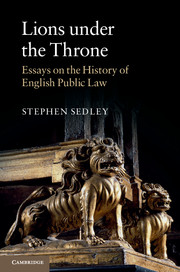Book contents
- Frontmatter
- Epigraph
- Dedication
- Contents
- Preface
- Introduction
- Part I Histories
- Part II Themes
- 6 The royal prerogative
- 7 The sovereignty of Parliament and the abuse of power
- 8 The right to be heard
- 9 The separation of powers
- 10 Public law and human rights
- 11 The state and the law
- 12 Standing and “sitting”
- 13 Law without courts: the tribunal system
- 14 The rule of law
- Index
12 - Standing and “sitting”
from Part II - Themes
Published online by Cambridge University Press: 05 November 2015
- Frontmatter
- Epigraph
- Dedication
- Contents
- Preface
- Introduction
- Part I Histories
- Part II Themes
- 6 The royal prerogative
- 7 The sovereignty of Parliament and the abuse of power
- 8 The right to be heard
- 9 The separation of powers
- 10 Public law and human rights
- 11 The state and the law
- 12 Standing and “sitting”
- 13 Law without courts: the tribunal system
- 14 The rule of law
- Index
Summary
“It has been the practice,” said the chief baron of the Exchequer in 1835, “which I hope never will be discontinued, for the officers of the Crown to throw no difficulty in the way of any proceeding for the purpose of bringing matters before a court of justice, where any real point of difficulty that requires judicial decision has occurred”. Who can bring a public law claim? Who answers for the state? These are not merely technical questions: the effectiveness of the rule of law depends on the answers.
The privy counsellors
In 1916, when anti-German feeling was running high and anti-semitism was no less than it had been for centuries, Sir George Makgill, a Scottish baronet of extreme right-wing views, who as well as being a writer of boys’ fiction was the secretary of the Anti-German Union, brought judicial review proceedings to disqualify from membership of the Privy Council two Jewish financiers of German origin, Sir Ernest Cassel and Sir Edgar Speyer, both of them British subjects and major philanthropists. Makgill's application, although it failed both in the Queen's Bench and in the Court of Appeal, is of considerable legal interest for more than one reason.
First, the courts at both levels accepted that the prerogative power of the King to appoint whom he chose to be a privy counsellor was justiciable, and that it was arguable – though incorrect – that it did not extend to appointing naturalised counsellors. Secondly, and more directly material to the present topic, the divisional court rejected the submission of the Attorney-General, F. E. Smith QC, that the claim should be dismissed because Makgill had no standing to bring it. Only the Attorney-General, as guardian of the public interest, Smith argued, could bring such a question as this before a court of law.
“No”, said Lord Reading CJ; “Sir George Makgill appears to have brought this matter before the court on purely public grounds without any private interest to serve, and it is to the public advantage that the law should be declared by judicial authority. I think the court ought to incline to the assistance, and not to the hindrance, of the applicant in such a case …”
- Type
- Chapter
- Information
- Lions under the ThroneEssays on the History of English Public Law, pp. 229 - 246Publisher: Cambridge University PressPrint publication year: 2015



